PRINCETON, NJ -- Perhaps it was the big East Coast snowstorm, the reduced holiday travel plans, or just a cautious consumer after a difficult year, but self-reported consumer spending continues to run 20% below last year's depressed weekly comparables. At the same time, Gallup's Economic Confidence Index shows consumers to be much less worried about the economy than they were a year ago, and Gallup's Job Creation Index shows that job-market conditions are much improved from earlier this year. And hope remains that a last-minute spending surge will save Christmas for the nation's retailers.
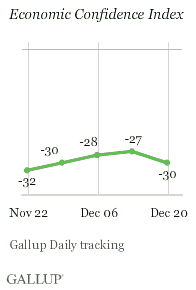
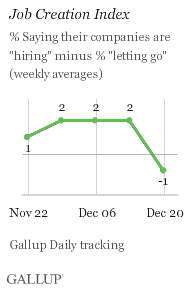
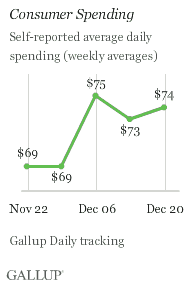
What Happened (Week Ending Dec. 20)
-
Consumer Spending continued to disappoint last week, as self-reported daily spending in stores, restaurants, gas stations, and online averaged $74 -- essentially the same as the prior two weeks, and down 20% from last year's $93-per-day comparable. This marks the fourth straight week in which consumer spending has trailed last year's anemic spending levels by at least 20%. It is even more disappointing, given that last week was a "paycheck week" and included "Super Saturday" -- both of which could have produced a spending surge. Part of the explanation may be that consumers are cutting back on holiday travel, thereby reducing their spending this December. The weather could also be playing a part. However, it may be that consumers are merely being more cautious about their spending and are less willing to buy on credit after a difficult year. On the other hand, while the data are not seasonally adjusted, it is still worth noting that the spending averages in recent weeks have been among the highest Gallup has recorded in 2009. Further, the year-over-year gap in spending has also been declining in recent weeks. Of course, retailers can hope that, as these positive comparisons might imply and as Gallup's Christmas gift survey suggests, there will be a last-minute consumer spending splurge as consumers and would-be travelers in particular -- who are traveling and entertaining less -- turn to buying more gifts.
-
Economic Confidence was down slightly last week, as Gallup's Economic Confidence Index was -30, versus -27 and -28, respectively, the prior two weeks. Still, current consumer optimism about the state of the U.S. economy is far better than it was a year ago, when the Index stood at -58. Consumers continued to give the current economy anemic ratings last week: 48% said it was "poor" and only 11% rated it as "excellent" or "good." While these ratings have shown little recent improvement, they are better than the 59% "poor" and the 9% "excellent" or "good" ratings of a year ago. More importantly, Americans' expectations for the economy going forward are far better now than they were a year ago, with 36% describing the economy as "getting better," versus 14% last year, and 58% saying the economy is "getting worse," compared to 80% just before Christmas 2008.
-
Job Creation deteriorated a little last week, as Gallup's Job Creation Index was at -1, worsening from the +2 of the prior three weeks and matching the job situation of a year ago. This marks the first time in 14 weeks that the Job Creation Index has turned negative. Twenty-two percent of employees last week said their companies are hiring, down from 26% the prior week and 25% in mid-December 2008. At the same time, 23% of employees said their companies are letting people go -- little changed from the 24% of the prior week but down slightly from the 26% of a year ago. Job-market conditions remain depressed -- improved from earlier this year but no better than those of a year ago. Job-market conditions are essentially unchanged since October.
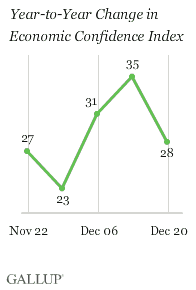
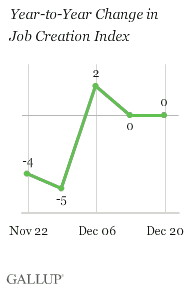
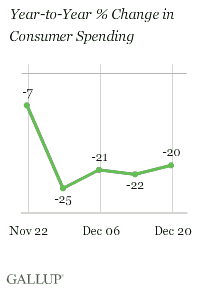
What to Watch For
On Wednesday, Reuters/University of Michigan will report its consumer sentiment index for December. While the consensus suggests that the final result for the month will be essentially unchanged from the earlier mid-month estimate, Gallup's Economic Confidence Index suggests consumer sentiment has declined slightly from earlier this month.
On Thursday, the government will report jobless claims; they are expected to decline after the prior two weeks of increases. Of course, jobless claims are extremely volatile around the holidays and thus hard to estimate, but Gallup's Job Creation Index suggests another increase is possible.
Regardless, Gallup's economic data show that consumers are much more optimistic about the prospects for economy than they were last Christmas. And while job-market conditions have improved from their abysmal status earlier this year, they are no better this holiday season than they were in 2008.
Still, when 58% of Americans say economic conditions are getting worse, not better, and job creation remains more anemic than it was last December, there is good reason for the nation's consumers to be cautious. Further, while the stock market has surged, many upper-income Americans remain "underwater" in both their investments and their houses. And many are uncertain about their future healthcare costs, energy prices, and federal, state, and local taxes.
As a result, it is not surprising that Gallup's behavior-based self-reported consumer discretionary spending remains down significantly from last Christmas. The composition of consumers' spending may change, as two-thirds of would-be travelers say they are cutting back on or canceling their trips, while consumers in general say they may spend a little more on Christmas gifts. In this regard, one can hope for a spending surge during this Christmas week -- even though last year, just the opposite was the case. Further, while spending is down a lot from last December, Gallup's weekly spending estimates have been running higher than they did earlier this year, suggesting a modest increase in spending around the holidays -- and the nation's retailers really need such a holiday gift this year.
But considering the financial strains of the past two years, reducing debt and increasing savings may be the best holiday gifts right now. Increased financial security is well worth celebrating, particularly until job creation once again begins to significantly exceed job loss across the nation.
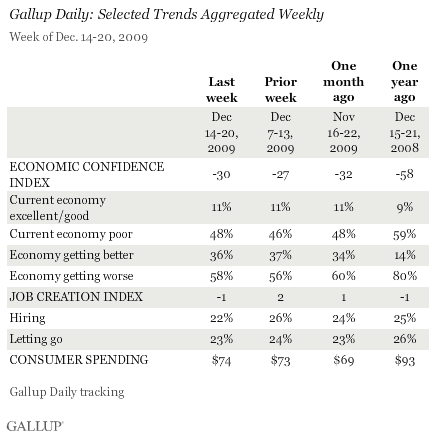
Review and export the complete daily trends on these measures: Economic Indexes; Consumer Spending; Economic Outlook; Economic Conditions; Job Market
Learn more about Gallup's economic measures.
Survey Methods
For Gallup Daily tracking, Gallup interviews approximately 1,000 national adults, aged 18 and older, each day. The Gallup consumer perceptions of the economy and consumer spending results are based on random half-samples of approximately 500 national adults, aged 18 and older, each day. The Gallup job creation and job loss results are based on a random half sample of approximately 250 current full- and part-time employees each day. Results from the week of Dec. 14-20, 2009, are based on telephone interviews with 3,403 adults for the consumer perceptions and spending questions. For these results, one can say with 95% confidence that the maximum margin of sampling error is ±2 percentage points. Results for the job creation and job loss questions are based on interviews with 1,931 employees, with a maximum margin of error of ±3 percentage points.
Interviews are conducted with respondents on land-line telephones and cellular phones.
In addition to sampling error, question wording and practical difficulties in conducting surveys can introduce error or bias into the findings of public opinion polls.
